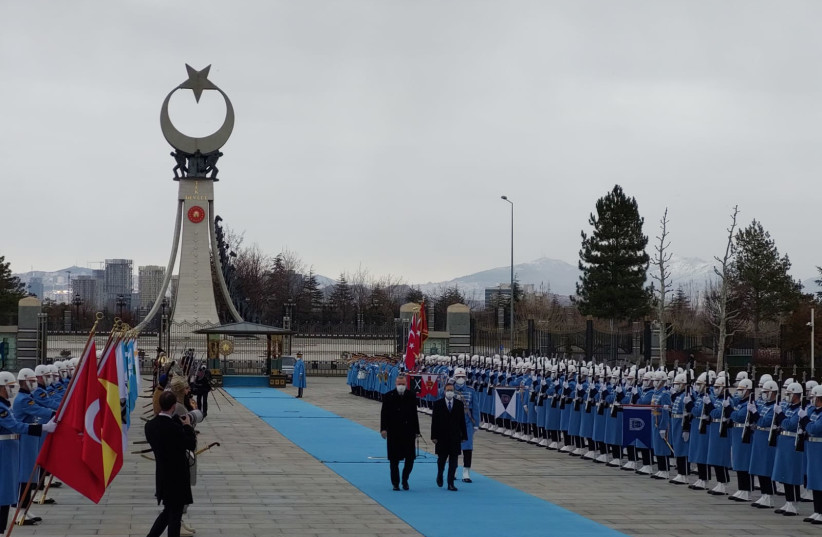ANKARA – President Isaac Herzog’s visit to Turkey at the invitation of President Recep Tayyip Erdogan was a timely one.
Next week Jews across the world will read Megilat Esther, the biblical Book of Esther, for the holiday of Purim; seeing a full honor guard and 21-gun salute for an Israeli leader in Turkey, along with Erdogan standing at attention for “Hatikvah,” brought to mind the sentence from the Megillah about Ahasuerus honoring Mordechai: “This is what is done for the man whom the king desires to honor.”
It also invoked the Megilah’s theme of a plot turned upside down, v’nahafoch hu, because seeing all of that pomp and circumstance for an Israeli, at Erdogan’s invitation, was truly a topsy-turvy moment.
The Talmud explains that Ahasuerus’s version of an honor guard was “not out of a love of Mordechai, but out of the hatred of Haman.”
That explanation is apt in this situation as well.

Erdogan’s overtures to Herzog are not out of love for Israel and they’re not out of hatred for anyone. But they are instrumental. Like many other countries, Turkey is looking at improved ties with Israel as a way to better its relationship with the United States.
Erdogan’s rhetoric has been particularly venomous, accusing Israel of murdering children; he harbors Hamas terrorists in his country; and the tightly censored media in Turkey has promoted antisemitic articles and television programs.
The Turkish president’s hostility toward Israel goes back over a decade, starting with Operation Cast Lead, which enraged Erdogan because he had met with then-prime minister Ehud Olmert just days before and felt he had been made to look like he approved it. Relations then hit their lowest point after the Mavi Marmara incident, in which IDF commandos boarded a ship seeking to break the blockade on Gaza, and encountered armed activists from a Turkish organization affiliated with Erdogan. In the ensuing hand-to-hand combat, nine of the activists were killed.
There were sporadic attempts to repair the relations, and Israel and Turkey even briefly exchanged ambassadors, only for the latter to spell Israel’s envoy again after the US recognized Jerusalem as Israel’s capital.
Now, once again, Erdogan has changed his mind, at a time when Turkey is in a situation where it needs to make friends. Its economy is in free fall, and Erdogan’s sharp tongue not only hurt ties with Israel but with many other countries in the region and beyond, relatively isolating Turkey.
In recent months, Erdogan has gone out of his way to repair relations with the United Arab Emirates, for example. Turkey is also hosting talks between Russia and Ukraine, in another attempt to show goodwill and neighborliness.
Another relationship Ankara has been looking to improve is with Washington. US President Joe Biden has called Erdogan an “autocrat,” and said he supports the opposition in Turkey.
In the 1990s, the American Jewish community was instrumental in improving Turkey-US ties, with organizations viewing Ankara as an important ally of Israel that is worth helping.
Rabbi Marc Schneier, president of the Foundation for Ethnic Understanding, who has played a role in fostering ties between Jews and Muslim states and Israel and its neighbors, advised Turkish Ambassador to the US Murat Mercan in April that improved Turkey-Israel ties would be a way to win some over in Washington. Schneier has been involved in encouraging the rapprochement ever since, and was at Erdogan’s presidential palace for Herzog’s visit.
Israel still viewed Erdogan with skepticism, thinking that the Turkish president was trying to harm Israel’s relations with his country’s historic adversaries Greece and Cyprus.
After all, Israel, Greece and Cyprus have a preliminary agreement to build the EastMed Pipeline from Israel to Europe. Though the pipeline does not yet have financial backing and there are questions about its feasibility, Erdogan has always eyed it with suspicion, and said that he would be willing to cooperate with Israel on gas projects.
The turning point, after which Jerusalem was more willing to take a leap of faith, came when Erdogan got personally involved in securing the release of the Oaknins, the Israeli couple arrested on November 11 for taking photographs of the presidential palace in Istanbul.
There is still a lot of skepticism in Israel about Erdogan’s intentions. Prime Minister Naftali Bennett said last month that they would be taking the relations slowly.
And the people surrounding Erdogan do not seem to have gotten the memo about patching things up with Israel. As recently as this week, his top adviser called the war in Ukraine a conspiracy between Israel and George Soros, which does not inspire much confidence.
In January, Turkey’s Religious Affairs Ministry continued its destabilizing actions in Jerusalem, organizing a “symposium meant to raise awareness about conflict in Jerusalem and al-Aqsa Mosque.”
Going all out for Herzog at the presidential palace, and Erdogan’s warm words for Herzog and for the value of ties with Israel are a good start, as is the move toward exchanging ambassadors between Jerusalem and Ankara. Recent reports in the Turkish media that the authorities informed Hamas they would have to clear out their military headquarters from the country are an even better sign.
But it is important to keep in mind that Erdogan’s v’nahafoch hu, his reversal, is not out of love for Israel.
